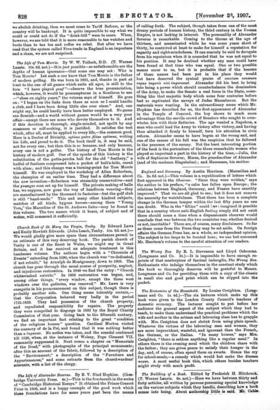The Life of Alexander Severus. By R. V. Nind Hopkins.
(Cam- bridge University Press. 4s.)—This is the fourteenth in the series of "Cambridge Historical Essays." It obtained the Prince Consort Prize in 1906, and is a happy example of the good work which these foundations have for some years past been the means of calling forth. The subject, though taken from one of the most dreary periods of human history, the third century in the Roman Empire, is not lacking in interest. The personality of Alexander Severus is remarkable. Coming to the throne at the age of thirteen, and assassinated while he was some years short of thirty, he contrived at least to make for himself a reputation for sagacity and rightemindedness.' It can scarcely be said to derogate from his reputation when it is conceded that he was not equal to his position. It may be doubted whether any man could have been found at that time who was equal. One or two possible names occur to us, but it is probable that if the bearers of these names had been put in his place they would but have deserved the cynical praise of minium consensts capax imperii nisi imperasset. Alexander did his best to bring into being a power which should counterbalance the domination of the Army, to make the Senate a real force in the State, some- thing like that majestic body which some four centuries before had so captivated the envoys of Judas Maccabaeus. But the materials were wanting. In the extraordinary scone which Mr. Hopkins has described for us, the first appearance of Alexander in the Temple of Concord, the boy shows to much more advantage than the servile crowd of Senators who sought to over- whelm him with their flatteries. The age wanted a Napoleon, a man who could lead the Army to victory after victory, and having thus attached it firmly to himself, turn his attention to civic reform. Alexander seems to have begun at the wrong end, and one of the causes of his fall was the suspicion that he faltered in the presence of the enemy. Not the least interesting portion of the book is the portraiture of the three remarkable women who played so important a part in the history of the time,—Julia, the wife of Septimius Severn; Mersa, the grandmother of Alexander (and of the madman Elagabalus) ; and Mammaea, his mother.


















































 Previous page
Previous page